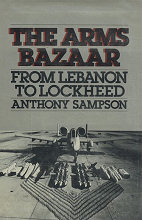
SAMPSON : The Arms Bazaar (fülszöveg)
Here is a guided tour along the brink of Armageddon, a report on the world arms trade which only Anthony Sampson—the premier journalist-historian of our time—could have researched and written. In this book he describes the development of the giant arms companies—led by Lockheed, the biggest of them all—and exposes the build-up to the biggest arms race in history, now showing itself in the Middle East. He tells how the industrial arms trade proliferated in the late nineteenth century, with such inventors as Hiram Maxim and Alfred Nobel, whose own brother was blown up by dynamite; how the debate about "Merchants of Death" raged through the nineteen-thirties; how during the Second World War the tiny California companies grew into vast but insecure corporations, uneasily married to the Pentagon; and how in the last few years, after the end of the Vietnam war and hard upon the Arab oil boycott and the energy crisis, a new wave of arms exports has provided jobs and foreign earnings for the Western countries. He shows how this man-on-a-tiger prosperity has been achieved at such dangerous prices as the crisis build-up of arms in the Persian Gulf and the turning of Lebanon into a ravaged laboratory for the testing of the weaponry of dozens of nations and factions.
This is a book not about the technicalities or strategy but about the character and motivations of the companies and the men who run them, and the problems of those trying to control them. Anthony Sampson has gone through the mass of new evidence of the last years; he has talked to company officials in California, New York, London, and Paris, to statesmen and diplomats in the Western capitals, and to Middle Eastern customers from the Shah of Iran to Adnan Khashoggi. He has gone to Tokyo to penetrate the incredible web of intrigue and bribery surrounding the sale of American airplanes to Japan. He has pieced together the jigsaw of evidence to produce a narrative that shows the interplay of companies and governments, of arms sellers and dealers, with the stakes and tension constantly increasing, and the issue of bribery always in the background. Throughout the narrative he tries to answer the recurring questions and problems of the arms trade, particularly in relation to the contemporary crisis. Are the companies really out of control? Must Western economies still depend on arms sales for their prosperity? Is bribery inseparable from arms sales, and have bribes seriously affected the pattern of the trade? Have the recent scandals materially affected America's relations with client countries, and is there a fundamental difference of attitude between the three big Western arms sellers: the United States, Britain, and France?
Sampson sees the problems not in terms of villains and dark forces but in terms of dynamic and resourceful men who have been caught up in situations of desperate competition. He likens the current problems of the aerospace industry to the end of the railroad boom in the last century, which likewise turned companies to exporting arms; and he concludes with constructive suggestions as to how the headlong competition can be restrained.